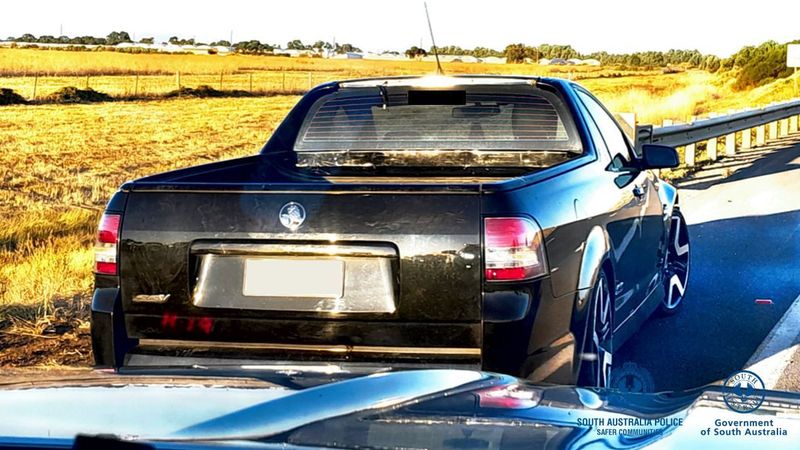Stunned Police Caught Learner Driver Allegedly Racing At Double Speed Limit - Here’s What Happened
By
- Replies 25
It's an absolute must for all learner drivers to obey the rules and regulations of the road, no matter how experienced or inexperienced they think they may be.
Driving safely at all times is of paramount importance, especially when you're still mastering the art of moving from A to B in a safe, efficient, and manageable way.
Unfortunately, that was not the case in South Australia earlier this week when a 20-year-old learner driver from Smithfield was caught by police after allegedly driving at 143km/h over the speed limit.
Just after 6:30 pm on Monday, a North-South Motorway patrol spotted a black 2008 Holden ute travelling at what seems to be an alarming 253km/h in a 110km/h area. The car broke down a short way on the road, and the driver was arrested shortly thereafter.
The driver was found to have a learner's licence while the passenger – his supervisor – also did not have a full licence. In addition to this, the driver returned a positive reading to a drug test, which is currently being analysed.

Driving over the speed limit can be a deadly and costly mistake. Not only can speed cause serious physical and emotional harm, it increases the risks of getting into an accident and potentially taking someone's life.
On the roads, vehicles with more speed have less time to react and more chances of colliding with other cars. The chances of dying in a crash double by exceeding the speed limit by only 8–17 km/h, meaning travelling at only slightly over the speed limit drastically increases the risk of being killed or seriously injured in an accident.
Speed also increases the severity of a crash and the cost of repairs. If a vehicle is travelling at over the speed limit, the chances of projections or impact flying off is greater, and the impacts of the crash are more dramatic. This means that speed has a direct effect on the amount of damage repair costs will incur.
Above all, the greatest danger of travelling over the speed limit is the loss of life that can occur. Lives are taken or ruined in an instant due to the irresponsible decision to break the speed limit.
Speaking of the consequences of speeding, the man has not only been charged with various driving offences that will soon be heard in court but he was also issued with an immediate 12-month licence suspension and his vehicle was impounded for 28 days.
Driving at an excessive speed can have serious consequences, and the penalties in Australia are both severe and wide-ranging.
The laws vary between states and territories, but all carry significant penalties including fines, licence suspension and demerit points per offence. In severe cases, such as excessive speeding in certain time frames, people can have their licences disqualified and receive jail time.
In South Australia, the law states that any driver found travelling up to 45km/h over the speed limit may face up to $1472 in fines, in addition to their licence being suspended for at least 3 months.
Meanwhile, a driver travelling 45km/h or greater over the speed limit will be fined up to $1658, have their licence suspended for 6 months, and face a potential court hearing.
The maximum fine for careless driving in South Australia is a whopping $2,500, with a potential court hearing and a licence disqualification period of 12 months.
The legal repercussions for reckless driving in Australia can be severe - any driver caught travelling far over the speed limit may not only face an on-the-spot suspension or fine, but also potential consequences such as court hearings, jail time and large fines.

Members, we remind and encourage you to always obey the rules of the road at all times.
Driving defensively and taking the speed limit seriously are two of the surest ways to keep yourself and others out of harm's way and lessen the risk of a crash occurring.
Keep yourself safe out there, everyone. Now, we’re wondering whether the younger generation is more reckless while driving? Or are there simply better ways to catch offenders now? What do you think?
Driving safely at all times is of paramount importance, especially when you're still mastering the art of moving from A to B in a safe, efficient, and manageable way.
Unfortunately, that was not the case in South Australia earlier this week when a 20-year-old learner driver from Smithfield was caught by police after allegedly driving at 143km/h over the speed limit.
Just after 6:30 pm on Monday, a North-South Motorway patrol spotted a black 2008 Holden ute travelling at what seems to be an alarming 253km/h in a 110km/h area. The car broke down a short way on the road, and the driver was arrested shortly thereafter.
The driver was found to have a learner's licence while the passenger – his supervisor – also did not have a full licence. In addition to this, the driver returned a positive reading to a drug test, which is currently being analysed.
A black ute was allegedly caught speeding at 253 km/h in a 110 km/h zone at Waterloo Corner, north of Adelaide. Credit: South Australia Police.
Driving over the speed limit can be a deadly and costly mistake. Not only can speed cause serious physical and emotional harm, it increases the risks of getting into an accident and potentially taking someone's life.
On the roads, vehicles with more speed have less time to react and more chances of colliding with other cars. The chances of dying in a crash double by exceeding the speed limit by only 8–17 km/h, meaning travelling at only slightly over the speed limit drastically increases the risk of being killed or seriously injured in an accident.
Speed also increases the severity of a crash and the cost of repairs. If a vehicle is travelling at over the speed limit, the chances of projections or impact flying off is greater, and the impacts of the crash are more dramatic. This means that speed has a direct effect on the amount of damage repair costs will incur.
Above all, the greatest danger of travelling over the speed limit is the loss of life that can occur. Lives are taken or ruined in an instant due to the irresponsible decision to break the speed limit.
Speaking of the consequences of speeding, the man has not only been charged with various driving offences that will soon be heard in court but he was also issued with an immediate 12-month licence suspension and his vehicle was impounded for 28 days.
Driving at an excessive speed can have serious consequences, and the penalties in Australia are both severe and wide-ranging.
The laws vary between states and territories, but all carry significant penalties including fines, licence suspension and demerit points per offence. In severe cases, such as excessive speeding in certain time frames, people can have their licences disqualified and receive jail time.
In South Australia, the law states that any driver found travelling up to 45km/h over the speed limit may face up to $1472 in fines, in addition to their licence being suspended for at least 3 months.
Meanwhile, a driver travelling 45km/h or greater over the speed limit will be fined up to $1658, have their licence suspended for 6 months, and face a potential court hearing.
The maximum fine for careless driving in South Australia is a whopping $2,500, with a potential court hearing and a licence disqualification period of 12 months.
The legal repercussions for reckless driving in Australia can be severe - any driver caught travelling far over the speed limit may not only face an on-the-spot suspension or fine, but also potential consequences such as court hearings, jail time and large fines.
Key Takeaways
- A learner driver in South Australia was allegedly clocked travelling at 253 km/h in a 110 km/h zone.
- The driver and passenger both only held L plates.
- The driver allegedly returned a positive reading to a drug test.
- He was charged with multiple driving offences, lost his licence on the spot, and his ute was impounded for 28 days.
Members, we remind and encourage you to always obey the rules of the road at all times.
Driving defensively and taking the speed limit seriously are two of the surest ways to keep yourself and others out of harm's way and lessen the risk of a crash occurring.
Keep yourself safe out there, everyone. Now, we’re wondering whether the younger generation is more reckless while driving? Or are there simply better ways to catch offenders now? What do you think?







